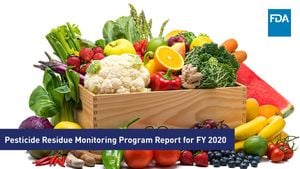Wheat prices have surged significantly across Arab countries, alarming both consumers and producers alike. The uptick has been particularly pronounced over the past year, leading to growing concerns over food security and economic stability across the region.
The rise, which has been felt from Egypt to Lebanon and Iraq, can be attributed to multiple factors, including disruptions to global supply chains, fluctuations within international markets, and the effects of extreme weather conditions on local crops. These elements have combined to create a scenario where families are struggling to afford basic staples, as noted by consumer rights advocate Fatima Saeed. She expressed her dismay, stating, "Many families are struggling to afford basic staples now; this is unacceptable."
According to food security analyst Ahmed El-Din, the continued increase of wheat prices poses dire consequences, especially for the poorest demographics. He emphasized, "The rise in wheat prices is alarming and will undoubtedly impact the poorest among us." This sentiment resonates throughout households where the cost of bread and other wheat-based products are locally determined and directly affect daily lives.
The challenges are not only economic but also agricultural. Researcher Ranya Ali pointed out, "Weather conditions have exacerbated the situation, leading to lower local yields," indicating a downward spiral influenced by climate anomalies. The combination of unseasonable rains and droughts has made harvesting crops considerably more difficult, thereby straining the available supply and driving prices higher.
Local governments are at the center of this crisis but response measures have varied. Agricultural economist Khaled Hassan called for immediate action, insisting, "The government must intervene to stabilize prices before it’s too late." A lack of proactive measures could lead to continued inflation and deteriorate the already precarious food security situation for many families.
The interconnectivity of global markets means fluctuations elsewhere can have local consequences. Arab states are particularly reliant on wheat imports, and international market trends have rendered these imports increasingly costly. Since many countries don't produce enough wheat to meet their needs, price increases can severely impact their economies and social welfare systems.
Beyond the current crisis, experts worry about long-term sustainability and the likely aftermath of perceived negligence by governing bodies. People await decisive steps to alleviate their burdens, fearing the socioeconomic ramifications of soaring grocery prices which have already begun to knock on their doorsteps.
Consumer groups and independent analysts have begun calling for transparent pricing strategies and local engagements to facilitate dialogue around food security issues. These discussions could help bridge the gap between government policy and the needs of everyday citizens.
Despite facing seemingly insurmountable challenges, there remains hope within the system. Collaborative efforts between governments, businesses, and organizations might offer avenues for innovation and sustainable solutions to avert future crises. The urgency of collective action has never been clearer, as families across Arab nations grapple with the hard reality of rising wheat prices, seeking both relief and resolution.
For many, the rising cost of wheat is not just another statistic; it's a pressing reality. With their livelihoods at stake and the threat of food insecurity looming, the call for action resonates across kitchens and markets alike, where the stakes continue to rise.



